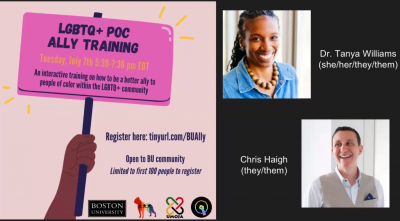The Stonewall Riots, a series of New York City protests in the late 1960s, have been credited with mobilizing the gay rights movement and Gay Pride parades every June since. But often forgotten in this historic moment are the Black and Brown voices within the LGBTQ community that spearheaded the fight.

Modern activists and scholars say they are trying to rectify this erasure.
Proponents leading that charge include Chris Haigh, founder of social equity organization True Change Associates, and Tanya O. Williams, lead consultant for inclusivity training group Authentic Coaching and Consulting. Both social justice educators spoke with around 80 Boston University students, faculty and alumni on Tuesday about allyship to people of color within queer spaces.
The “LGBTQ+ POC Allyship Training,” hosted by BU’s Queer Activist Collective, called Q, as well as UMOJA: The Black Student Union and Student Government, sought to evaluate the erasure of non-white people in the LGBTQ movement. It also analyzed support and negligence from white people within and outside those marginalized groups.
Williams said in an interview that, in response to George Floyd’s death and other racial injustices against Black Americans, increased focus on effective advocacy for people of color is vital.
“A lot of people have really been striving to bring their own conscientiousness around being allies to parts of communities that have been maybe left out,” Williams said. “Allyship is never for another group: allyship is about acting against a system that oppresses everyone.”
During the two-hour long discussion, Williams defined three stages of allyship: actor, ally and accomplice. These stages progress respectively from observation of racist systems to direct action challenging those systems, she said.
Allies can disrupt circumstances that “incubate and are dominated by Whiteness,” Williams said, but in terms of civic and moral responsibility, this is sometimes not enough.
“Being an ally is not an invitation to be in Black and Brown spaces to gain Brownie points, lead and take over. Some of what is true about allyship is that we have to check our intentions,” Williams said during the event. “We all want to be an ‘accomplice’ to ending oppressive structures.”
Speaking about race can be uncomfortable, said Madeleine, a member of Q and rising senior in the College of Arts and Sciences who requested to not publish her surname. She said this type of training can lessen the pressures of allyship by educating participants on the importance of such conversations.
“Sometimes I am a little overwhelmed about what’s happening and the state of things,” Madeleine said. “I get caught up in that rather than figuring out how to rise above the emotional blocks and initial emotional reactions that I have to topics of race and racism.”
According to The Trevor Project, LGBTQ youth in the U.S. are four times more likely to attempt suicide than the average young person, but Black transgender women are most at risk. This disparity is also seen in COVID-19 cases, which disproportionately impact Black communities as well as the unhoused — 40 percent of which are young and queer-identifying, according to a 2018 study by the University of Chicago.
Haigh shared their experience with their gender identity and its connection with their race, and said POC are often still excluded from LGBTQ discussions.
“I realized that I was queer long before I realized that I was white,” Haigh said during the talk. “It’s a powerful statement for me in thinking about how I hold and many of us hold, in some way, a combination of both marginalization and privilege.”
This type of privilege, even within minority groups, was a focus throughout the event and in smaller break-out sessions, which also centered around the pitfalls of allyship and the act of learning effective ways to show support for LGBTQ people and POC.
Student group collaborators, including Nyah Jordan, vice president of internal affairs for StuGov, and Christa Nuzzo, vice president of Q, said they believe BU administration should continue to sponsor allyship trainings and provide platforms to elevate queer voices.
Jordan, a rising junior in the College of Communication, said in an interview that this training session is only a first step to a continual learning process students should be engaging with outside of their required coursework.
“We especially wanted to have more dialogue concerning these topics and concerning experiences of people of color in the LGBT community, because it’s not as talked about and not as talked about in the classroom,” Jordan said. “And then not only conversations but action. What can you do to really be anti-racist? What can you do to be a true ally?”
Nuzzo, who has helped organize around 20 virtual events for Q in the past few months, said several University policy changes are necessary to better amplify queer POC’s voices on campus, including more focus on mental health support and the enforcement of mandatory trainings.
“My goal is really for these trainings to be mandatory to try to reach those people that aren’t willingly signing up,” Nuzzo said, “the people that have the privilege to be ignorant and not realize that they should be attending this training.”
















































































































